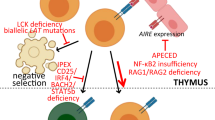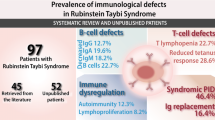Abstract
To estimate the prevalence of monogenic inborn errors of immunity in patients with autoimmune diseases (AID), the study included 56 subjects (male:female ratio: 1.07) with mean age of onset of autoimmunity 7 years (4 months–46 years). 21/56 had polyautoimmunity. 5/56 patients met the JMF criteria for PID. The different AID referred were hematological (42%) > gastrointestinal (GI) (16%) > skin (14%) > endocrine (10%) > rheumatological (8%) > renal (6%) > neurological (2%). 36/56 reported recurrent infections. 27/56 were on polyimmunotherapy. 18/52 (35%) had CD19 lymphopenia, 24/52 (46%) had CD4 lymphopenia, 11/52 (21%) had CD8 lymphopenia, and 14/48 (29%) had NK lymphopenia. 21/50 (42%) had hypogammaglobinemia; 3 of whom were given rituximab. 28/56 were found to have pathogenic variants among PIRD genes. These 28 patients had 42 AID among which hematological was most common (50%) > GI (14%) = skin (14%)> endocrine (9%) > rheumatological (7%) > renal and neurological (2%). Hematological AID was the most common AID (75%) in children with PIRD. Positive predictive value (PPV) of abnormal immunological tests was 50% and sensitivity of 70%. JMF criteria had specificity of 100% in identifying PIRD and sensitivity of 17%. Polyautoimmunity had a PPV of 35% and sensitivity of 40%. 11/28 of these children were offered transplant. 8/28 were started on sirolimus, 2/28 on abatacept, and 3/28 on baricitinib/ruxolitinib after diagnosis. In conclusion, 50% of children with AID have underlying PIRD. LRBA deficiency and STAT1 GOF were the most common PIRD. Age at presentation, number of autoimmunity, routine immunological tests, and JMF criteria are not predictive of underlying PIRD. Early diagnosis with exome sequencing alters the prognosis and opens new therapeutic avenue.




Similar content being viewed by others
Data availability
Authors confirm that all relevant data are included in the article, figures, and tables.
Code availability
Not applicable.
Abbreviations
- AID:
-
Autoimmune disease
- JMF:
-
Jeffrey Modell Foundation
- PID:
-
Primary immunodeficiency
- PIRD:
-
Primary immune regulatory disorders
- IEI:
-
Inborn errors of immunity
- LRBA:
-
Lipopolysaccharide (LPS)-responsive and beige-like anchor protein deficiency
- STAT1/3 GOF:
-
Signal transducer and activator of transcription 1/3 gain of function
- CTLA4:
-
Cytotoxic T-lymphocyte-associated protein 4 haploinsufficiency
- ACP5:
-
Acid phosphatase 5
- NFKB1/2:
-
Nuclear factor NF-kappa-B subunit 1/2
- NLRP12:
-
NACHT, LRR, and PYD domains-containing protein 12
- CARD11 GOF:
-
Caspase recruitment domain family member 11
- RTEL1:
-
Regulator of telomere elongation helicase 1
- NCF2:
-
Neutrophil cytosolic factor 2
- ATM:
-
Ataxia-telangiectasia mutated
- RAG1:
-
Recombination activating gene 1
- BTK:
-
Bruton tyrosine kinase
- IL12RB1:
-
Interleukin 12 receptor beta subunit 1
- CHAPEL:
-
Hyperactivation of complement, angiopathic thrombosis, and protein-losing enteropathy
- FOXP3:
-
Forkhead box P3
- PIK3CD:
-
Phosphatidylinositol-4,5-bisphosphate 3-kinase catalytic subunit delta
- CD40L:
-
Cluster of differentiation 40 ligand
- ADA2:
-
Adenosine deaminase 2 deficiency
- PCR:
-
Polymerase chain reaction
- EBV:
-
Epstein-Barr virus
- CMV:
-
Cytomegalovirus
- ANA:
-
Anti-nuclear antibody
- GAD:
-
Glutamic acid decarboxylase
- TTgIgA:
-
Tissue transglutaminase immunoglobulin A
- DCT:
-
Direct Coombs test
- TPO:
-
Thyroid peroxidase
- CBC:
-
Complete blood count
- TNFAIP3:
-
Tumor necrosis factor, alpha-induced protein 3
- DNASE1:
-
Deoxyribonuclease I
- MEFV:
-
MEditerranean FeVer
- IL2RB:
-
Interleukin-2 receptor subunit beta
- LYST:
-
Lysosomal trafficking regulator
- ERCC6:
-
ERCC excision repair 6, chromatin remodeling factor
- PRF1:
-
Perforin 1
- SUMO4:
-
Small ubiquitin like modifier 4
- VUS:
-
Variant of uncertain significance
- GI:
-
Gastrointestinal
- JAK:
-
Janus kinase
- CMC:
-
Chronic mucocutaneous candidiasis
- VEOIBD:
-
Very early onset inflammatory bowel disease
- DM:
-
Diabetes mellitus
- HBA1C:
-
Hemoglobin A1c
- HSCT:
-
Hematopoietic stem cell transplant
- CVID:
-
Common variable immunodeficiency
- IVIG:
-
Intravenous immunoglobulin
- ACMG:
-
American College of Medical Genetics
References
Walter JE, Ayala IA, Milojevic D. Autoimmunity as a continuum in primary immunodeficiency. Curr Opin Pediatr. 2019;31(6):851–62.
Amaya-Uribe L, Rojas M, Azizi G, Anaya JM, Gershwin ME. Primary immunodeficiency and autoimmunity: a comprehensive review. J Autoimmun. 2019;99:52–72.
Hadjadj J, Aladjidi N, Fernandes H, Leverger G, Magérus-Chatinet A, Mazerolles F, et al. Pediatric Evans syndrome is associated with a high frequency of potentially damaging variants in immune genes. Blood. 2019;134(1):9–21.
Jeffrey Modell Foundation. National Primary Immunodeficiency Resource Center. 10 warning signs of primary immunodeficiency. http://downloads.info4pi.org/pdfs/10-Warning-Signs%2D%2D-Generic-Text%2D%2D2-.pdf. Accessed 12 Feb 2022.
Monaghan TF, Rahman SN, Agudelo CW, Wein AJ, Lazar JM, Everaert K, et al. Foundational statistical principles in medical research: sensitivity, specificity, positive predictive value, and negative predictive value. Medicina (B Aires). 2021;57(5):503.
Richards S, Aziz N, Bale S, Bick D, Das S, Gastier-Foster J, et al. Standards and guidelines for the interpretation of sequence variants: a joint consensus recommendation of the American College of Medical Genetics and Genomics and the Association for Molecular Pathology. Genet Med. 2015;17(5):405–24.
Chougule A, Taur P, Gowri V, Iyengar VV, Mudaliar S, Madkaikar MR, et al. SPENCD presenting with Evans phenotype and clinical response to JAK1/2 inhibitors—a report of 2 cases. J Clin Immunol. 2023;43(2):331–4.
Gowri V, Taur P, Chougule A, Desai M. STAT 3 GOF with polycythemia: a twist to the tale-first case report from India. J Clin Immunol. 2022;42(4):866–8.
Massaad MJ, Zainal M, Al-Herz W. Frequency and manifestations of autoimmunity among children registered in the Kuwait National Primary Immunodeficiency Registry. Front Immunol. 2020;2:11.
Warnatz K, Voll RE. Pathogenesis of autoimmunity in common variable immunodeficiency. Front Immunol. 2012;3:210.
Fischer A, Provot J, Jais JP, Alcais A, Mahlaoui N, Adoue D, et al. Autoimmune and inflammatory manifestations occur frequently in patients with primary immunodeficiencies. J Allergy Clin Immunol. 2017;140(5):1388–1393.e8.
Barsalou J, Saint-Cyr C, Drouin E, le Deist F, Haddad E. High prevalence of primary immune deficiencies in children with autoimmune disorders. Clin Exp Rheumatol. 2011;29(1):125–30.
Hoyt KJ, Chatila TA, Notarangelo LD, Hazen MM, Janssen E, Henderson LA. The immunologic features of patients with early-onset and polyautoimmunity. Clin Immunol. 2020;211:108326.
Arango MTSYCR. Infection and autoimmune diseases. In: Anaya JMSYRVA, editor. Autoimmunity: from bench to bedside. 1st ed. Bogota (Colombia): El Rosario University Press; 2013.
Pradhan S, Sengupta M, Dutta A, Bhattacharyya K, Bag SK, Dutta C, et al. Indian genetic disease database. Nucleic Acids Res. 2011;39(Database):D933–8.
Tangye SG, Al-Herz W, Bousfiha A, Cunningham-Rundles C, Franco JL, Holland SM, et al. Human inborn errors of immunity: 2022 update on the classification from the International Union of Immunological Societies Expert Committee. J Clin Immunol. 2022;42(7):1473–507.
Shevach EM, Thornton AM. tTregs, pTregs, and iTregs: similarities and differences. Immunol Rev. 2014;259(1):88–102.
Cepika AM, Sato Y, Liu JMH, Uyeda MJ, Bacchetta R, Roncarolo MG. Tregopathies: monogenic diseases resulting in regulatory T-cell deficiency. J Allergy Clin Immunol. 2018;142(6):1679–95.
Jamee M, Hosseinzadeh S, Sharifinejad N, Zaki-Dizaji M, Matloubi M, Hasani M, et al. Comprehensive comparison between 222 CTLA-4 haploinsufficiency and 212 LRBA deficiency patients: a systematic review. Clin Exp Immunol. 2021;205(1):28–43.
Zhang W, Chen X, Gao G, Xing S, Zhou L, Tang X, et al. Clinical relevance of gain- and loss-of-function germline mutations in STAT1: a systematic review. Front Immunol. 2021;11:12.
Fabre A, Marchal S, Barlogis V, Mari B, Barbry P, Rohrlich PS, et al. Clinical aspects of STAT3 gain-of-function germline mutations: a systematic review. J Allergy Clin Immunol Pract. 2019;7(6):1958–1969.e9.
Charbit-Henrion F, Parlato M, Hanein S, Duclaux-Loras R, Nowak J, Begue B, et al. Diagnostic yield of next-generation sequencing in very early-onset inflammatory bowel diseases: a multicentre study. J Crohns Colitis. 2018;12(9):1104–12.
Johnson MB, Patel KA, de Franco E, Houghton JAL, McDonald TJ, Ellard S, et al. A type 1 diabetes genetic risk score can discriminate monogenic autoimmunity with diabetes from early-onset clustering of polygenic autoimmunity with diabetes. Diabetologia. 2018;61(4):862–9.
Strakova V, Elblova L, Johnson MB, Dusatkova P, Obermannova B, Petruzelkova L, et al. Screening of monogenic autoimmune diabetes among children with type 1 diabetes and multiple autoimmune diseases: is it worth doing? J Pediatr Endocrinol Metab. 2019;32(10):1147–53.
Moin A, Farhoudi A, Moin M, Pourpak Z, Bazargan N. Cutaneous manifestations of primary immunodeficiency diseases in children. Iran J Allergy Asthma Immunol. 2006;5(3):121–6.
Berron-Ruiz A, Berron-Perez R, Ruiz-Maldonado R. Cutaneous markers of primary immunodeficiency diseases in children. Pediatr Dermatol. 2000;17(2):91–6.
Cowan MJ, Neven B, Cavazanna-Calvo M, Fischer A, Puck J. Hematopoietic stem cell transplantation for severe combined immunodeficiency diseases. Biol Blood Marrow Transplant. 2008;14(1):73–80.
Neven B, Ferrua F. Hematopoietic stem cell transplantation for combined immunodeficiencies, on behalf of IEWP-EBMT. Front Pediatr. 2020;7:552.
Tesch VK, Abolhassani H, Shadur B, Zobel J, Mareika Y, Sharapova S, et al. Long-term outcome of LRBA deficiency in 76 patients after various treatment modalities as evaluated by the immune deficiency and dysregulation activity (IDDA) score. J Allergy Clin Immunol. 2020;145(5):1452–63.
Kolukısa B, Barış S. Primary immune regulatory disorders and targeted therapies. Turk J Hematol. 2021;38(1):1.
Kiykim A, Ogulur I, Dursun E, Charbonnier LM, Nain E, Cekic S, et al. Abatacept as a long-term targeted therapy for LRBA deficiency. J Allergy Clin Immunol Pract. 2019;7(8):2790–2800.e15.
Baris S, Alroqi F, Kiykim A, Karakoc-Aydiner E, Ogulur I, Ozen A, et al. Severe early-onset combined immunodeficiency due to heterozygous gain-of-function mutations in STAT1. J Clin Immunol. 2016;36(7):641–8.
Acknowledgements
We would like to acknowledge Dr. Zinet Currimbhoy who started the immunology department at B. J. Wadia Hospital for Children in early 2000s and continued to support and mentor the department till her death in 2021. Dr. Sangeeta Mudaliar, Dr. Purva Kanvinde, Dr. Ritika Khurana, Dr. Ira Shah, Dr. Sudha Rao, Dr. Rajesh Joshi, Dr. Sikha Agarwal, Dr. Manish Shah, Dr. Alpana Ohri, Dr. Laxmi Shobhavat, Dr. Rekha Solomon, Dr. Shilpa Kulkarni, and Dr. Ambreen Pandrowala from Bai Jerbai Wadia hospital for children for patient referral and management.
Funding
The study was partly funded by Indian Council of Medical Research (ICMR), New Delhi, India, under the Centre of Excellence in PID project (vide Grant No. 61/02/2012/IMM/BMS).
Author information
Authors and Affiliations
Contributions
Vaishnavi V Iyengar conceptualized and designed the study, collection and analysis of data, drafted the initial manuscript, reviewed and revised the manuscript. Akshaya Chougule collected data, reviewed and revised the manuscript. Vijaya Gowri collected data, carried out the initial analysis, reviewed and revised the manuscript. Prasad Taur collection of data, carried out the initial analysis, reviewed and revised the manuscript. Shakuntala Prabhu and Minnie Bodhanwala supervised data collection and critical revision of article. Manisha Madkaikar immunological work-up of patient, reviewed and revised the manuscript. Mukesh M Desai conceptualized the study, supervision of study, interpretation of data and critical revision of article.
Corresponding author
Ethics declarations
Ethics approval
Ethics approval was taken from our hospital ethics committee. Helsinki declaration was followed.
Consent to participate
A written informed consent was taken from the guardian of the child included in the study.
Consent for publication
The authors affirm that the guardian provided informed consent for publication of the images.
Conflict of interest
The authors declare no competing interests.
Additional information
Publisher’s note
Springer Nature remains neutral with regard to jurisdictional claims in published maps and institutional affiliations.
Rights and permissions
Springer Nature or its licensor (e.g. a society or other partner) holds exclusive rights to this article under a publishing agreement with the author(s) or other rightsholder(s); author self-archiving of the accepted manuscript version of this article is solely governed by the terms of such publishing agreement and applicable law.
About this article
Cite this article
Venkatachari, I.V., Chougule, A., Gowri, V. et al. Monogenic inborn errors of immunity in autoimmune disorders. Immunol Res 71, 771–780 (2023). https://doi.org/10.1007/s12026-023-09391-3
Received:
Accepted:
Published:
Issue Date:
DOI: https://doi.org/10.1007/s12026-023-09391-3




